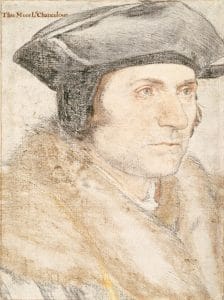 On this day in history, 17th April 1534, Sir Thomas More, Henry VIII’s Lord Chancellor and good friend, was sent to the Tower of London. He wasn’t sent there to see a prisoner, he was sent there as a prisoner.
On this day in history, 17th April 1534, Sir Thomas More, Henry VIII’s Lord Chancellor and good friend, was sent to the Tower of London. He wasn’t sent there to see a prisoner, he was sent there as a prisoner.
Sir Thomas More had been called to Lambeth four days earlier, on 13th April, to swear the oath of allegiance to the Act of Succession. More asked to see the Act of Succession:
“After which read secretly by myself, and the oath considered with the act, I showed unto them that my purpose was not to put any fault either in the act or any man that made it, or in the oath or any man that sware it, nor to condemn the conscience of any other man. But as for myself in good faith my conscience so moved me in the matter that though I would not deny to swear to the succession, yet unto the oath that there was offered me I could not swear, without the iubarding [jeoparding] of my soul to perpetual damnation.”
More’s refusal to swear the oath led to him being apprehended and he was “delivered to the abbot of Westminster to be kept as a prisoner” before being taken to the Tower of London.
You can read more about what happened at Lambeth, when he refused to swear the oath, and how he ended up being sent to the Tower in the letter he wrote to his eldest daughter, Margaret (Roper), from the Tower. Click here to read that now.
Picture: Sketch of Sir Thomas More by Hans Holbein the Younger.